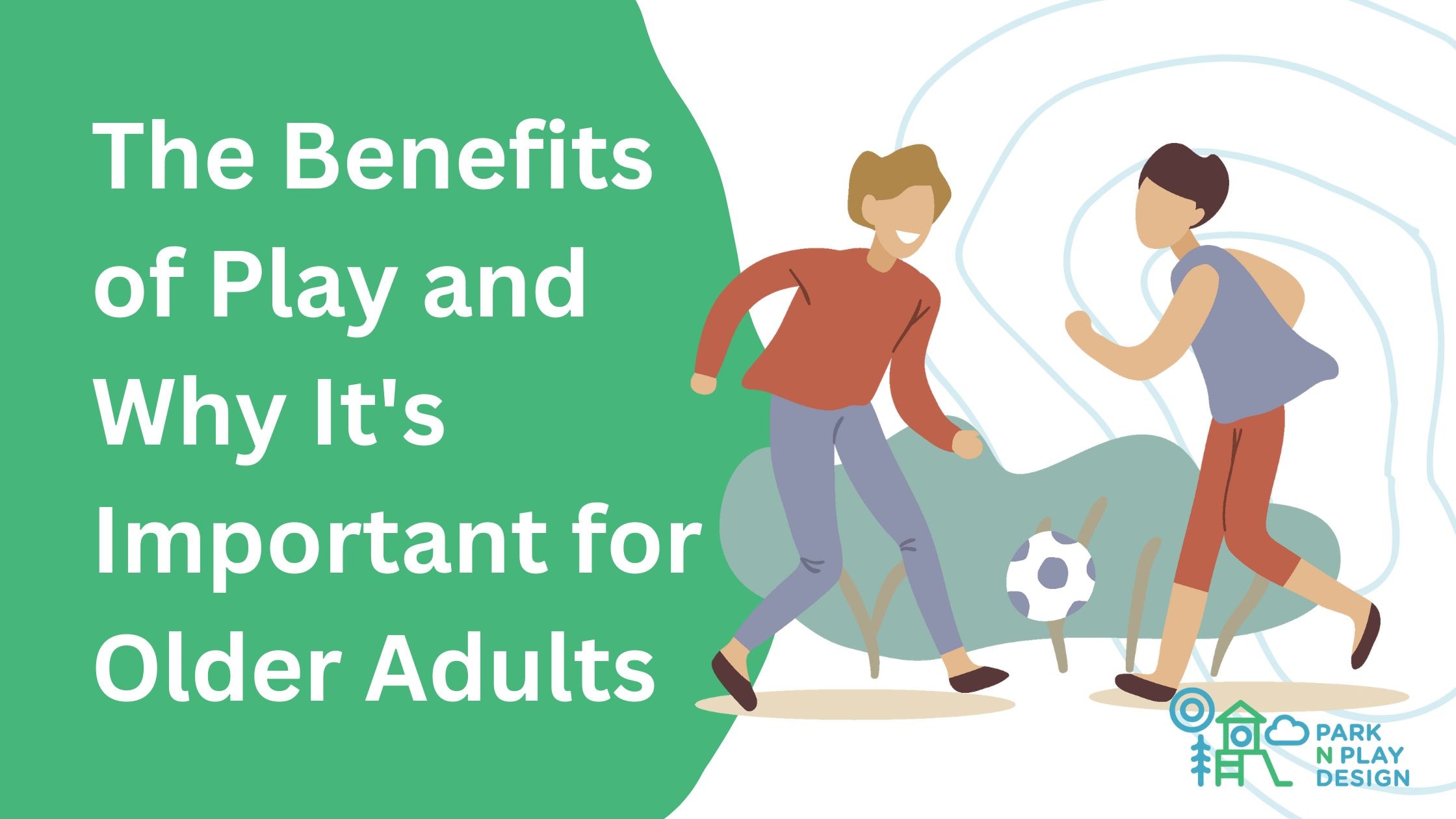The Benefits of Play and Why It's Important for Older Adults
Discover the benefits of play for older adults! It's not just fun but boosts brain power, strengthens relationships, and improves overall well-being.


When most people hear “play,” they picture children laughing and having fun together. Rarely do they think of older adults. Many believe that the idea of “playing” ends in childhood.
But who says playtime is just for kids? Play brings marvelous benefits to older adults, too! The play offers many benefits, from boosting brain power to strengthening relationships.
Let's explore why play is essential for older adults and how it positively impacts their lives.
The Benefits of Play

Play isn't just for kids; it's essential for older adults, too. Engaging in playful activities brings numerous benefits that enhance both physical and mental well-being.
Here are some key reasons why play is so important for older adults:
1. Relieves Stress
Play is a natural stress reliever. When older adults engage in playful activities, they experience the benefits of play for adults, such as reducing cortisol levels, the hormone associated with stress.
Laughter and enjoyment from play can lighten the mood and provide a mental escape from daily pressures. Simple activities like playing games or walking can bring joy and relaxation, making managing stress easier and improving overall well-being.
Embracing a playful nature can significantly enhance one's quality of life.
2. Boosts Brain Function
Engaging in games and puzzles keeps the brain active. For older adults, activities that challenge the mind, like Sudoku or crosswords, can improve memory and cognitive function.
This mental stimulation is vital for maintaining sharpness and potentially delaying the onset of cognitive decline. Keeping the brain busy with fun activities is a key to long-term brain health. Regularly participating in mentally stimulating games can help preserve cognitive abilities and enhance problem-solving skills.
Therefore, it's beneficial for older adults to play games that challenge their thinking and strategy skills frequently.
3. Strengthens Relationships
Play brings people together. These activities foster social connections, whether it's a game of cards or a group dance class.
Maintaining strong relationships is crucial for older adults' mental and emotional well-being. Play provides a platform for bonding, laughter, and shared experiences, essential for a fulfilling social life.
Activities that involve teamwork and interaction can deepen relationships and create lasting memories with friends and family.
4. Expands Opportunities
Engaging in diverse, playful activities opens up new experiences. Older adults can discover new hobbies, make new friends, and explore new interests.
Play can lead to new adventures and possibilities that enrich life. It's never too late to try something new and exciting.
By stepping out of their comfort zones and embracing new activities, older adults can continually grow and find joy in unexpected places, keeping life vibrant and fulfilling.
How Does Play Affect Health?
Play profoundly impacts overall health, offering numerous physical and mental health benefits. Here's how engaging in playful activities can significantly enhance the well-being of older adults:
Encourages Physical Activity
Play often involves movement. Activities like dancing, gardening, or even a simple game of catch encourage older adults to stay active.
Physical activity through play helps improve mobility, strength, and overall physical health. It's a fun way to exercise without feeling like a chore, making it easier to stay consistent and enjoy the benefits of regular movement.
Engaging in aerobic exercise through playful activities can also enhance cardiovascular health and boost energy levels.
Promotes Mental Well-being
The play has a positive impact on mental health. Engaging in enjoyable activities can lift the spirits, reduce anxiety, and combat depression.
Play allows older adults to nurture mental health and find joy in daily life. It's a natural mood booster that everyone can benefit from, providing a sense of purpose and happiness that enriches daily living.
Improves Brain Health
Regular mental challenges keep the brain healthy. Playful activities that require thinking, strategizing, and problem-solving are excellent for brain health.
For older adults, this means maintaining cognitive abilities and staying mentally sharp. A healthy brain contributes to overall well-being and quality of life, helping to prevent cognitive decline and keeping the mind engaged and vibrant.
Strengthens Relationship Intimacy
Play can deepen bonds with loved ones. Activities that require teamwork and communication enhance intimacy and connection.
For older adults, playing together can strengthen relationships with partners, friends, and family members. It's a way to spend time and build stronger emotional connections, fostering a sense of belonging and mutual support essential for emotional health.
Types of Play

Exploring different types of play can provide a wide range of benefits for older adults, from mental stimulation to physical health and social engagement. Here's a closer look at some enjoyable and beneficial activities, along with a few ideas to get started:
1. Games and Puzzles
Classic games like chess, card games, and jigsaw puzzles are excellent for mental stimulation. These activities challenge the mind, improve problem-solving skills, and provide a sense of accomplishment, making them perfect for keeping the brain sharp.
Regularly engaging in such games helps maintain cognitive functions, which is especially important for older adults. The sense of achievement and enjoyment derived from a board game can also boost self-esteem and provide productive leisure time.
Embracing these activities can help reconnect with one's inner child, bringing joy and playfulness to daily life.
2. Gardening and Nature Activities
Spending time in nature, gardening, or walking can be relaxing and invigorating. These activities, including the benefits of outdoor play, promote physical health by encouraging movement and offer a peaceful retreat from everyday stress, providing a natural way to unwind and enjoy the outdoors.
Gardening, in particular, can be very therapeutic as it involves nurturing plants and seeing the results of one's labor. Additionally, outdoor activities, such as fresh air and sunlight, can improve mood and overall well-being.
3. Culinary Adventures and Cooking Classes
Cooking together can be a delightful experience. Trying new recipes and cooking classes can be both fun and rewarding, offering a chance to learn new culinary skills, create delicious meals, and bond with others over a shared love of food.
These activities also encourage creativity and experimentation, which can be very fulfilling. Furthermore, cooking and sharing meals can foster social connections and allow one to enjoy and appreciate different cuisines and flavors.
4. Art and Music
Engaging in art and music activities can be very therapeutic. Painting, playing an instrument, or even attending a concert can stimulate creativity, provide emotional satisfaction, and offer a wonderful outlet for self-expression.
These activities can also help reduce stress and anxiety, as they provide a form of escapism and relaxation. Additionally, participating in art and music can enhance cognitive function and memory, making them valuable pastimes for older adults.
5. Dance
Dancing is a fantastic way to stay active and have fun. The importance of having fun is evident in how dancing not only benefits physical health by improving coordination and flexibility but also serves as an excellent social activity, bringing people together joyously and energetically.
Dancing also helps enhance cardiovascular health and build muscle strength, which is vital for maintaining mobility and balance. Its social aspect can lead to new friendships and a sense of community, making it a rewarding and enjoyable activity.
6. Storytelling and Book Clubs
Sharing stories or joining a book club can be intellectually stimulating and socially engaging. These activities encourage conversation, foster deeper connections with others, and provide a platform for discussing diverse ideas and perspectives.
Storytelling allows older adults to share their experiences and wisdom, creating a sense of legacy and continuity. On the other hand, book clubs offer a structured yet relaxed environment where members can explore new genres, debate plot points, and develop critical thinking skills while enjoying fellow readers' camaraderie.
7. Sensory Stimulation and Crafts
Crafting and activities that involve sensory stimulation can be very fulfilling. Creating something with your hands or engaging in sensory-rich activities can enhance mood, boost creativity, and improve overall well-being by providing a tactile and immersive experience.
These activities range from knitting and pottery to sensory gardens and texture exploration, each offering unique benefits. Crafting engages fine motor skills and provides a sense of accomplishment and purpose, which is especially beneficial for older adults looking to stay active and engaged.
8. Imaginative Play
Engaging in imaginative play, like acting or making-believe games, can be incredibly freeing. It encourages creativity, fosters a sense of adventure, and allows individuals to explore different scenarios and roles, making it a fun and liberating experience at any age.
Imaginative play can include role-playing, theater arts, or even storytelling with a twist, where participants create and enact their own stories. This type of play stimulates the imagination, promotes problem-solving skills, and can be a joyful way to break from routine and experience the world with a fresh perspective.
Consider organizing a fun outdoor game of charades or a themed game night for adult play to engage everyone and keep the excitement alive.
Enhance Play for Older Adults with Park N Play Design
Play is not just child's play; it's a vital part of life for older adults. It relieves stress, boosts brain function, and strengthens relationships. Play promotes physical activity and mental well-being, keeping both the body and mind healthy.
There are endless play opportunities, whether through games, gardening, or cooking. So, let's embrace the joy of play and enrich our lives at any age. Play is the secret to a happy, healthy, and fulfilling life.
To make play even more enjoyable and accessible, check out Park N Play Design for therapeutic fitness products, cognitive activity panels, shade and site furnishings, and inter-generational activities well-suited for older adults living facilities.
FAQs
Why are activities important for older adults?
Engaging in activities helps older adults maintain physical and mental health, reducing the risk of illness and cognitive decline. Activities also provide social interaction, essential for emotional well-being and combating loneliness.
What is the importance of purpose in older adults?
Having a sense of purpose gives older adults a reason to stay active and engaged, positively impacting their happiness and life satisfaction. Purposeful activities can improve mental health, lower the risk of depression, and enhance the quality of life.
How can playing with children be good for older people?
Playing with children can bring joy and laughter, reduce stress, and foster a connection across generations. It also keeps older adults physically active and mentally sharp, providing a fun and engaging way to stay healthy.











